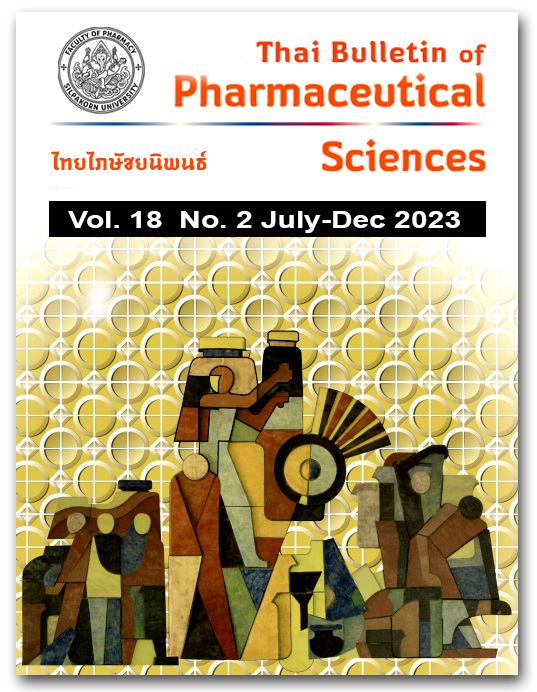IMPLEMENTING “RATIONAL DRUG USE PROVINCE” POLICY THROUGH SYSTEMS GOVERNANCE: A QUALITATIVE RESEARCH
DOI:
https://doi.org/10.69598/tbps.18.2.143-165Keywords:
rational drug use, RDU province, policy implementation, systems governanceAbstract
Promoting rational drug use at the provincial level (RDU Province) is leverage to achieve the national goal of a rational drug use country (RDU Country). This qualitative research analyzed mechanisms to reach the RDU province as a concept within health systems governance. Nine provinces that continuously demonstrated development in RDU implementation were selected for this research. Key participants were pharmacists and their teams who were responsible for RDU implementation in steering the work at the district and provincial levels. Data was collected from group interviews via Zoom application and thematically analyzed through 5 functions of the health systems governance. The results revealed that RDU province was implemented through the following activities. 1) Policy guidance: the provinces have set clear policies, goals and performance indicators on RDU. 2) System design for implementing the policies: several mechanisms were used, such as having a provincial leader chair the RDU committee, joining RDU activities with other relevant committees, continuously and consistently presenting situations of RDU performance to executives and practitioners, communicating to clarify policies, and integrating RDU work with routine work. 3) Generating intelligence was strenghtened by using data to drive the countinuous quality improvement process, cultivating a culture of data-driven decision-making, and organizing a knowledge-exchange forum. 4) Building collaborations and partnerships were conducted through local committees on quality of life development with cooperation of community leaders and public sector networks. 5) Ensuring accountability was carried out by developing a transparent working system that can be reviewed and assessed from other sectors.
References
Puripunyavanich N. Policy recommendations for promoting rational drug use in Thailand Nonthaburi: Health Systems Research Institute; 2017. (in Thai)
The National Drug Committee. National Drug Policy A.D. 2011 and National Drug System Development Strategy A.D. 2012-2016. Nonthaburi, Thailand: Food and Drug Administration; 2011. (in Thai)
The National Rational Drug Use Committee. Rational Drug Use Hospital Manual. Bangkok: National RDU Committee; 2015. (in Thai)
Puripunyavanich N. Rational Drug Use Country...How will we reach that destination? Ya Wipak (DMDC Newsletter). 2558;7(28):19-21 (in Thai).
Thammatacharee N, Tomacha N, Pannarunothai S. Advocacy on rational drug use policy in Thailand. J Health Sys Res. 2022;16(2):281-8. (in Thai)
Eua-Anant S. The process and results of the rational drug use advocacy in Khon Kaen province. Ya Wipak (DMDC Newsletter). 2015;7(28):12-5 (in Thai).
Kiatying-Angsulee N, Sirisinsuk Y, Suwankesawong W, Chaisumritchoke ST, Pumtong S, Chanjaruporn F, et al. Chapter 6 Drug utilization. In: Chokevivat V, Tantivess S, Jamniandamrongkarn S, editors. Thai Drug System 2020. Nonthaburi: Health Systems Research Institute; 2020. p. 256-321. (in Thai)
Pumtong S, Suwannaprom P, Suttajit S, Puripunyawanich N, Kiatying-Angsulee N. Irrational antibiotic use and distribution in the Thai community: A complex situation in need of integrative solution. J Health Sci. 2020;29(Special Issue):S72-S81.
Thai Food and Drug Administration. People, purpose and passion; the pathway to success for RDU country Prince Mahidol Award Conference (PMAC) 2020 Side meeting; 30 January 2020; Centara Grand Bangkok Convention Centre at CentralWorld, Bangkok2020.
Health Administration Division Office of the Permanent Secretary. Rational drug use community: RDU community. Nonthaburi: Office of the Permanent Secretary Ministry of Public Health; 2020. (in Thai)
Office of the Permanent Secretary Ministry of Public Health. Service plan: rational drug use. Nonthaburi: Office of the Permanent Secretary; 2016. (in Thai)
Strategy and planning division of Office of the Permanent Secretary Ministry of Public Health. Key performance indicator of Ministry of Public Health, Fiscal year 2021. Nonthaburi: Office of the Permanent Secretary Ministry of Public Health; 2021. (in Thai)
World Health Organization. Everybody's business: strengthening health systems to improve health outcomes: WHO's framework for action. Geneva: WHO; 2007. 44 p.
World Health Organization. Health systems governance for universal health coverage action plan: department of health systems governance and financing 2014.
Limsawart W. National health system governance of Thailand after promulgation of the National Health Act B.E. 2550: Framework, development and proposal for improvement. J Health Sys Res. 2009;3(3):419-33. (in Thai)
Meesuk A. The Rational Drug Use Policy implementation of health facilities of the Ministry of Public Health (MOPH). Political Science Review. 2019;5(2):105-7. (in Thai)
Wicheancharoen K, Prasertchai A, Thammakun T. Performance evaluation base on drug use policies of hospitals under the Office of the Permanent Secretary, Ministry of Public Health in Phetchaburi Province. Academic Journal of Community Public Health. 2022;8(1):110-22. (in Thai)
Bullock HL, Lavis JN. Understanding the supports needed for policy implementation: a comparative analysis of the placement of intermediaries across three mental health systems. Health Res Policy Syst. 2019;17(1):82.
Limsawart W. National health system governance of Thailand after promulgation of the National Health Act B.E. 2550: Framework, development and proposal for improvement. J Health Sys Res. 2019;3(3):419-33. (in Thai)
Promjun T, Udomaksorn K, Wanishayakorn T. Effect of the behavioral economics based measure to contain antibiotic use: A case of a general hospital in Patttani. Thai J Pharm Pract. 2565;14(4):843-55. (in Thai)
Leesawat J, Lorga T. Development of the integrated hospital-based food safety program in Lampang. Thai J Pharm Pract. 2022;14(4):1035-47. (in Thai)
Thinkeaw S, Awiphan R, Ruengorn C. Development of surveillance system for the distribution of prohibited drugs in grocery stores through the policy for promoting rational drug use in community at Lea Subdistrict, Phang-nga. Thai J Pharm Pract. 2023;15(2):316-30. (in Thai)
Downloads
Published
How to Cite
Issue
Section
License
All articles published and information contained in this journal such as text, graphics, logos and images is copyrighted by and proprietary to the Thai Bulletin of Pharmaceutical Sciences, and may not be reproduced in whole or in part by persons, organizations, or corporations other than the Thai Bulletin of Pharmaceutical Sciences and the authors without prior written permission.



